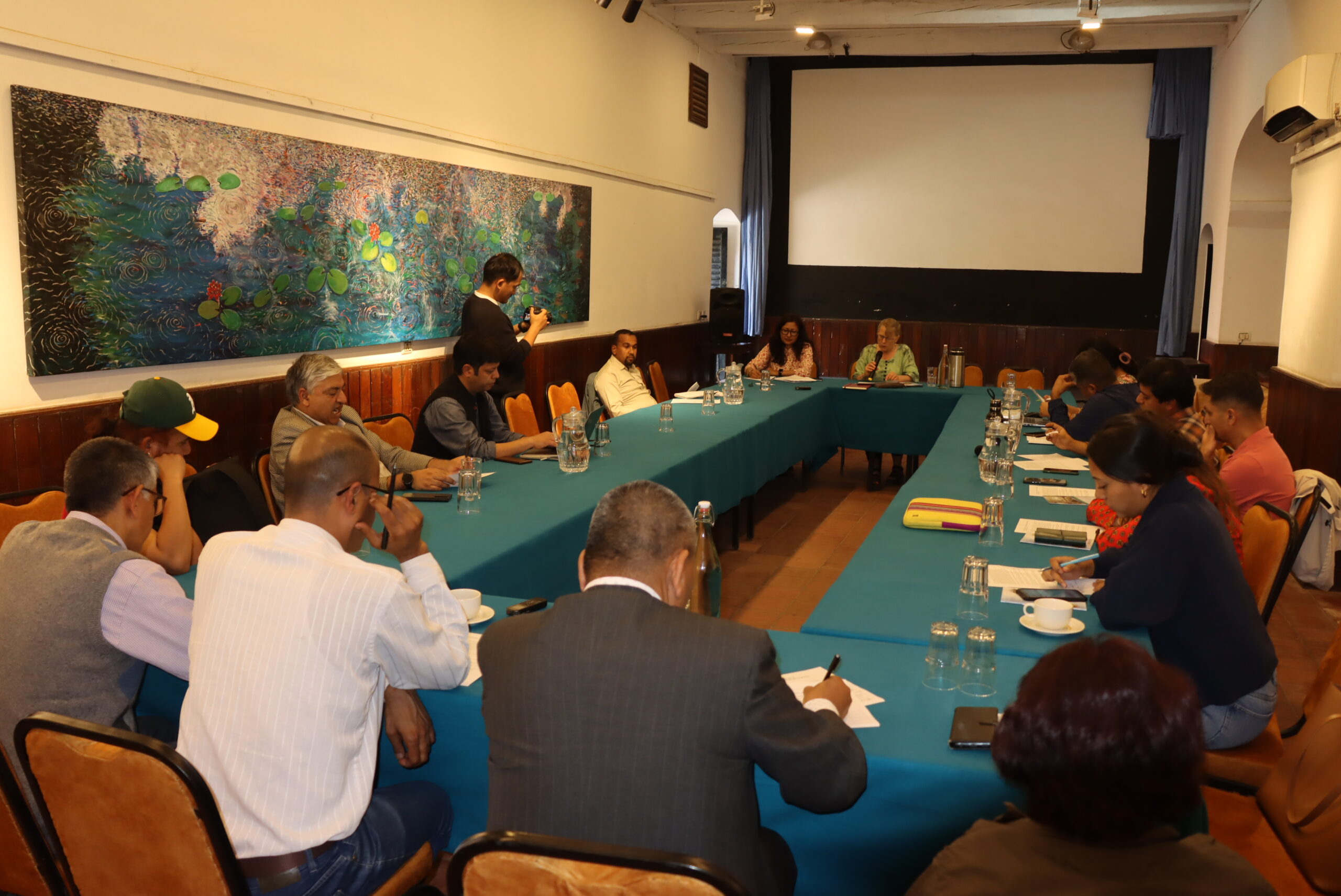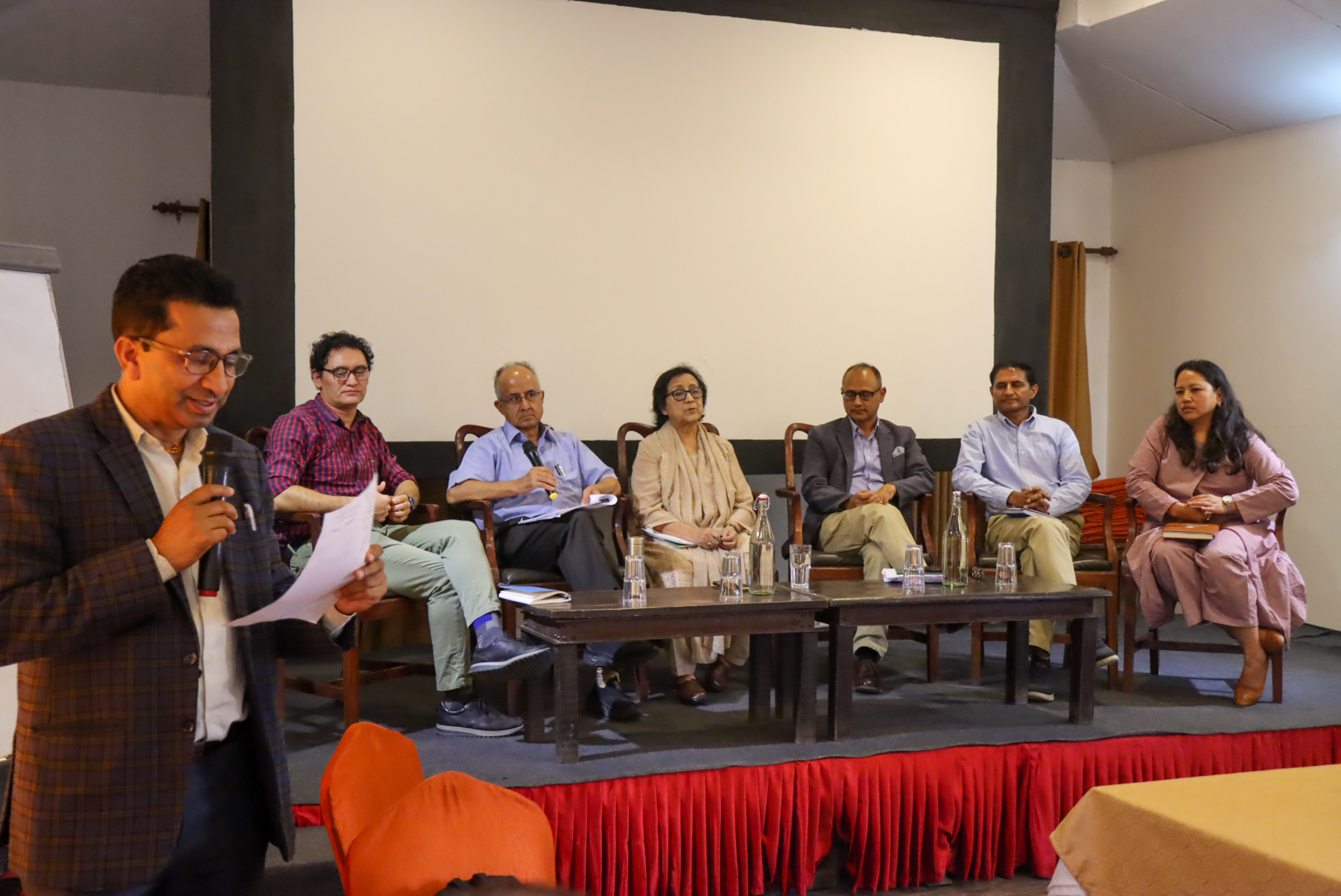Southasia Institute of Advanced Studies (SIAS), in collaboration with Dhulikhel Municipality (DM), organized a workshop entitled “Research output dissemination and reflective workshop” on 3rd March 2023. Apart from focusing on water management practices, policies and documenting the local knowledge at Kavrebhanjyang, SIAS has been co-working with the local government and the local communities in mapping the local water sources and documenting their status and associated social issues. This workshop had three major objectives: (i) sharing the findings of the study (ii), handing over the research reports, maps and summary in Nepali language to the municipal and the ward government (iii) facilitating deliberative discussions between the local governments and communities for discussing options for inclusive, equitable and sustainable water management in the area. It was organized at the municipality office. A total of 33 participants- including municipal authorities, ward committee members of ward-9, community representatives and researchers from SIAS participated in the event.
The hydro-social report and maps of local water sources handed over to the local authorities are expected to support the local government and communities in a participatory process of water governance and collaboratively develop future water management plans to ensure access to clean water as has been envisioned under the municipality initiated “One-house-one-tap” initiative. Apart from handing over these documents to the local governments, a summary of hydro-social report in Nepali language, including the inventory of the water sources of ward-9 and maps of different water supply system was provided to all the participants.
The workshop started with welcome remarks by Deputy Mayor of Dhulikhel Municipality, Mr. Nirajan Jangam followed by introductions of the participants. After this was the presentation of Dr. Dilli Prasad Poudel reflecting on the research engagement of SIAS in collaboration with DM. In the presentation, Dr. Poudel also re-introduced the PolCaps project highlighting its objectives and briefly updating the activities conducted at Kavrebhanjyang since the start of the project in 2020. Next, Dr. Anushiya Shrestha shared the lessons from international water management practices that can be useful references for urbanizing municipalities like Dhulikhel to co-develop the sustainable water management strategies. Dr. Shrestha particularly highlighted the cases of Perth, Himachal Pradesh and Uttarakhand. During the presentation, she also briefly shared the strategies envisioned by our national water related policies for ensuring safe and clean drinking water to all. She also highlighted that our national policies have prioritized the mapping of sources and thus source mapping of Kavrebhanjyang can be beneficial to make sustainable water management strategies.
After the presentation, Mr. Binod Adhikari shared the findings of the mapping process and displayed the maps of different water sources. He briefly explained the reasons for initiating the mapping of water resource in Kavrebhanjyang, the methodologies adopted for the data collection and about the categorization of the sources that were done during the mapping process. Next, a short video reflecting the research activities and methodologies adopted for the research was presented that helped to summarize the journey of the project at Kavrebhanjyang. Moving forward, Mr. Badri Humagain, Chairperson of ward-9 in his remarks appreciated the efforts of SIAS in identifying and mapping the sources of Kavrebhajyang. He also urged the local authorities and communities to apply the learnings of the research for the sustainable management of water resources. He also admitted that the project’s learnings can be replicated in other places as well.
In the next session, a panel of five members comprising municipal authorities, ward chairperson and representatives of drinking water user groups was formed. The session was facilitated by Dr. Maniram Banjade. Each panelist expressed their views on the importance of traditional water sources, challenges for their utilization, and possibilities for integrating different sources for optimum utilization. The panelist highlighted the importance of the local water sources despite the changing water use pattern and implementation of mega water supply system. They also stressed on the importance of integration of the local water sources and groundwater extraction system to ensure water security for all and urged to not solely depend on a single water supply system. At the end of the panel discussion, Dr. Banjade summarized the discussion. Concluding his remarks, Dr. Banjade shed light on the importance of local water sources in addition to the existing large water supply system. He also expressed that collaborative effort from both the community and the local authority will be crucial to ensure the equitable use and conservation of available sources.
After the panel discussion, was the remarks by Mr. Ashok Byanju, the Mayor of Dhulikhel Municipality. Mr. Byanju briefly highlighted the municipal efforts to improve the water supply services and appreciated SIAS for their efforts to explore the water sources of ward-9. In response to our suggestions of adopting different alternatives to ensure a sustainable drinking water supply service in Kaverbhanjyang, he remarked that the municipality is flexible in implementing and integrating different alternatives. He emphasized the importance of a reliable water supply system for economic development and the need of multiple water supply systems in the urbanizing and changing climatic contexts. Mr. Byanju assured financial support for sustainable and equitable water management and stressed that the municipal government expects coordination and support from the communities in this regard. He further added that the various complications that exist in the water supply system of the ward can be resolved by discussing the use and distribution system between the local authorities and communities. In his remarks, the mayor also highlighted that the existing water sources fall under the jurisdiction of municipal government and that the water sources need to be shared and collectively utilized. He also appreciated the commitment of Mr. Badri Humagain, chairperson of ward-9 to ensure the equitable use of the sources and their conservation. Closing his remarks, Mr. Ashok Byanju re-assured the ward and community support to manage sustainable and equitable supply of clean drinking water in Kavrebhnajyang, thanked communities for their active participation in the event and formally ended the workshop.




